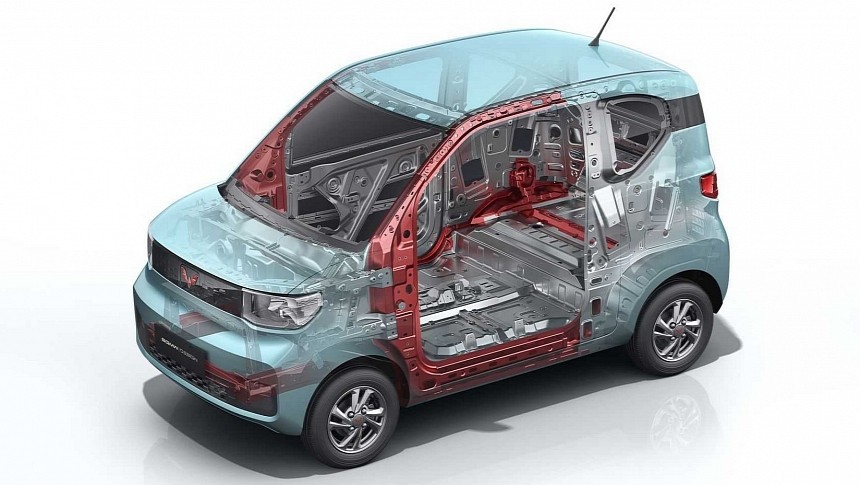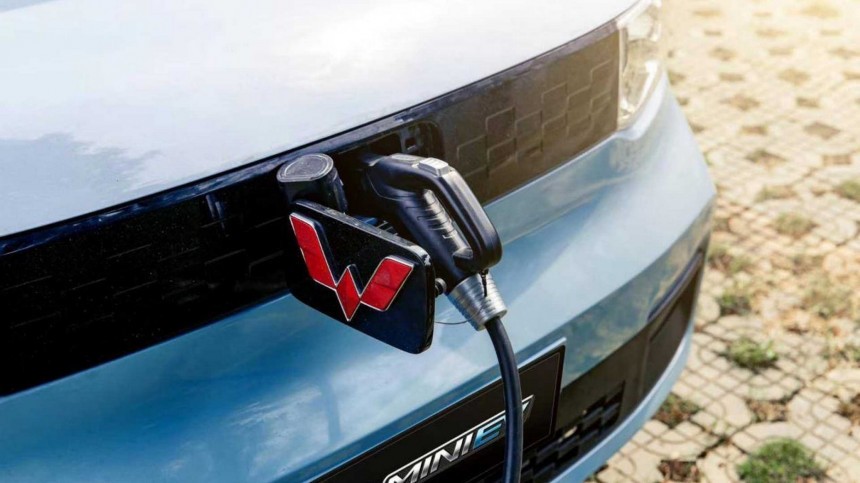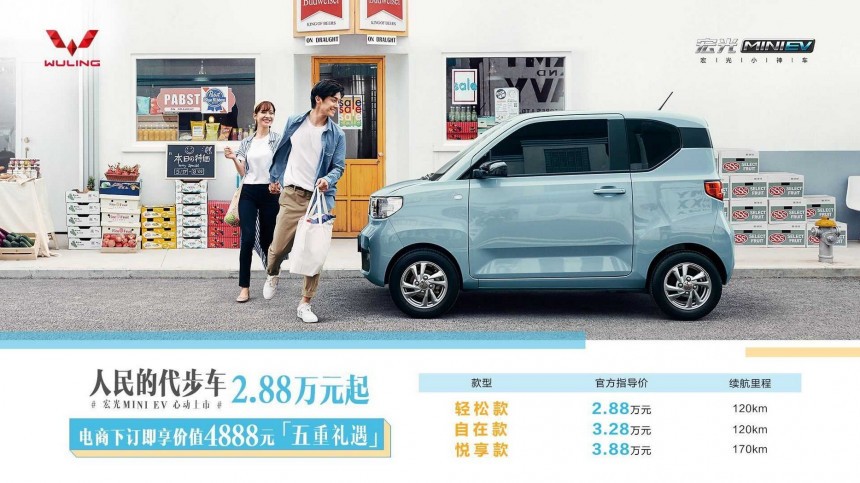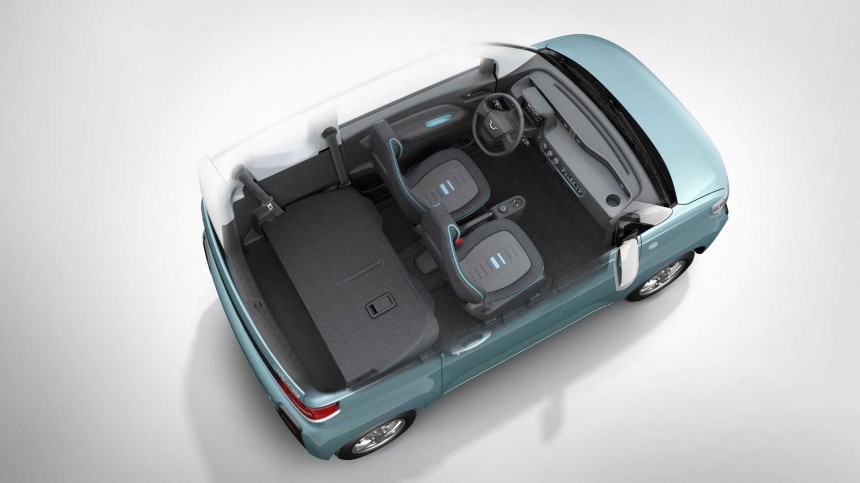Wuling never had any problems with selling the Hongguang Mini EV, an electric quadricycle that costs only RMB32,800 ($4,650 at the current exchange rate)... until very recently. In January, it became the third BEV to reach 1 million units sold after the Tesla Model 3 and Model Y. Like these competitors, the Mini EV got old. To make it more attractive, Wuling came up with an idea that may solve concerns about battery pack longevity.
What the Chinese brand decided to do was to decouple the price of the car from that of the component. That made the Mini EV price drop from RMB32,800 to RMB19,800 ($2,807), which suggests the 13.9-kWh LFP component costs RMB13,000 ($1,843). As battery electric vehicles cannot work without a battery pack and the Mini EV does not have a swappable part, Wuling established a monthly fee for the battery pack use – RMB558 ($79).
Those familiar with the Renault ZOE will say this is nothing new. Indeed: even VinFast proposed a battery pack lease model for its vehicles. However, CarNewsChina wrote that Wuling's proposition is actually not some sort of renting. It would be a fixed-sum zero-interest loan for 60 months. Unfortunately, the numbers do not confirm that this is really the case.
If anyone were to pay RMB558 for 60 months, they would spend RMB33,480 ($4,746). That's more than the Wuling Hongguang Mini EV costs. Considering the battery pack costs RMB13,000, anyone paying for the component in installments would spare RMB217 ($31) per month without interest if they were to fully pay it after 60 months. I tried to confirm the prices and conditions on Wuling's Chinese website, but it apparently does not include information about this special sale strategy or any details about it.
Even if we eventually discover that Wuling never proposed to do that, the idea is still valid and fairly attractive. Suppose automakers could support the cost of financing these battery packs and offer this model to all customers. That could even be a way to retain battery pack property, as Volkswagen tried to achieve by leasing used vehicles. In this new model, the German company would just lease the battery pack.
This sales strategy would promote BEV adoption by both reducing their prices and giving these owners peace of mind if the component eventually presented any issues. Theoretically, they could pay for it in eight years instead of five, covering the entire warranty period for it in most countries. When the time came to replace the battery pack in any BEV – which is a given with the current battery technology – automakers could offer a new one under the same purchase model to ensure these vehicles would continue to run. Is there anything more sustainable than keeping on the roads a car that does not pollute as much as combustion-engined vehicles?
The problem with this idea is that it would probably only work with smaller and more affordable battery packs. Suppose Tesla adopted it. Instead of charging $20,000 for the 90-kWh battery packs that older Model S units with the BMS_u029 and BMS_u018 are demanding, it would charge these early adopters $333 per month in 60 months or $208 if it could offer this sale disguised as leasing for eight years. Unfortunately, Tesla only provides four years of warranty for these battery pack replacements, which means the monthly installments would be $417 if they were supposed to last as much as the warranty. In any of these three scenarios, that kind of money would be enough to buy or lease a new car – not necessarily a BEV.
This is why battery packs either have to be more affordable or have to be used in a different way. Reducing their sizes will also reduce the range. Using a more affordable chemistry such as LFP will deliver less range and increase mass in these vehicles, which also makes them run shorter distances. For owners with cars that would not work otherwise, that may be a hell of a deal.
Still, battery swapping could have the same effect as this new sales method Wuling adopted. Plug-in hybrids could reduce the size of the battery packs, ensuring urban routes would still be covered exclusively by electricity. The truth is that it is clear that carbon-neutral personal transportation cannot rely on the model that Tesla and Nissan forged years ago.
When the Roadster and the LEAF emerged, people were still wondering if BEVs were viable – apart from accusing GM of killing the electric car when it made the EV1 disappear. When Tesla created the Model S and kicked off the Supercharging network, it promised battery packs would last as much as the cars. It still does that in its Impact Reports, but we know that is not true.
With evidence of that for anyone to see, it is time carmakers start dealing with battery packs as wear components. Treating them like that from the very beginning – since the vehicles are first put for sale – and making it easier to buy them is an excellent service for BEVs. Too bad if no one else adopts the same approach Wuling may have conceived: they definitely should.
Those familiar with the Renault ZOE will say this is nothing new. Indeed: even VinFast proposed a battery pack lease model for its vehicles. However, CarNewsChina wrote that Wuling's proposition is actually not some sort of renting. It would be a fixed-sum zero-interest loan for 60 months. Unfortunately, the numbers do not confirm that this is really the case.
Even if we eventually discover that Wuling never proposed to do that, the idea is still valid and fairly attractive. Suppose automakers could support the cost of financing these battery packs and offer this model to all customers. That could even be a way to retain battery pack property, as Volkswagen tried to achieve by leasing used vehicles. In this new model, the German company would just lease the battery pack.
The problem with this idea is that it would probably only work with smaller and more affordable battery packs. Suppose Tesla adopted it. Instead of charging $20,000 for the 90-kWh battery packs that older Model S units with the BMS_u029 and BMS_u018 are demanding, it would charge these early adopters $333 per month in 60 months or $208 if it could offer this sale disguised as leasing for eight years. Unfortunately, Tesla only provides four years of warranty for these battery pack replacements, which means the monthly installments would be $417 if they were supposed to last as much as the warranty. In any of these three scenarios, that kind of money would be enough to buy or lease a new car – not necessarily a BEV.
Still, battery swapping could have the same effect as this new sales method Wuling adopted. Plug-in hybrids could reduce the size of the battery packs, ensuring urban routes would still be covered exclusively by electricity. The truth is that it is clear that carbon-neutral personal transportation cannot rely on the model that Tesla and Nissan forged years ago.
When the Roadster and the LEAF emerged, people were still wondering if BEVs were viable – apart from accusing GM of killing the electric car when it made the EV1 disappear. When Tesla created the Model S and kicked off the Supercharging network, it promised battery packs would last as much as the cars. It still does that in its Impact Reports, but we know that is not true.
With evidence of that for anyone to see, it is time carmakers start dealing with battery packs as wear components. Treating them like that from the very beginning – since the vehicles are first put for sale – and making it easier to buy them is an excellent service for BEVs. Too bad if no one else adopts the same approach Wuling may have conceived: they definitely should.

























